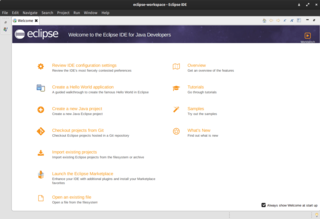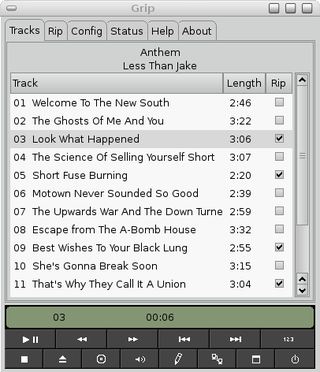Related Research Articles

Eclipse is an integrated development environment (IDE) used in computer programming. It contains a base workspace and an extensible plug-in system for customizing the environment. It is the second-most-popular IDE for Java development, and, until 2016, was the most popular. Eclipse is written mostly in Java and its primary use is for developing Java applications, but it may also be used to develop applications in other programming languages via plug-ins, including Ada, ABAP, C, C++, C#, Clojure, COBOL, D, Erlang, Fortran, Groovy, Haskell, HLASM, JavaScript, Julia, Lasso, Lua, NATURAL, Perl, PHP, PL/I, Prolog, Python, R, Rexx, Ruby, Rust, Scala, and Scheme. It can also be used to develop documents with LaTeX and packages for the software Mathematica. Development environments include the Eclipse Java development tools (JDT) for Java and Scala, Eclipse CDT for C/C++, and Eclipse PDT for PHP, among others.
In computing, the Common Public License (CPL) is a free software / open-source software license published by IBM. The Free Software Foundation and Open Source Initiative have approved the license terms of the CPL.

Grip is a free CD player and CD ripper.

The Eclipse Public License (EPL) is a free and open source software license most notably used for the Eclipse IDE and other projects by the Eclipse Foundation. It replaces the Common Public License (CPL) and removes certain terms relating to litigations related to patents.
These tables compare free software / open-source operating systems. Where not all of the versions support a feature, the first version which supports it is listed.
The following tables list notable software packages that are nominal IDEs; standalone tools such as source-code editors and GUI builders are not included. These IDEs are listed in alphabetic order of the supported language.

Fedora Linux is a Linux distribution developed by the Fedora Project. It was originally developed in 2003 as a continuation of the Red Hat Linux project. It contains software distributed under various free and open-source licenses and aims to be on the leading edge of open-source technologies. It is now the upstream source for CentOS Stream and Red Hat Enterprise Linux.

PHP Development Tools (PDT) is a language IDE plugin for the Eclipse platform and the open-source project that develops it.

JFire was an Enterprise Resource Planning and Customer Relationship Management system.
Remote Application Platform Project is an open-source software project under the Eclipse Technology Project which aims to enable software developers to build Ajax-enabled rich Internet applications by using the Eclipse development model, plugins and a Java-only application programming interface (API). It can be considered a counterpart for web development to the Rich Client Platform (RCP). The API is very similar to RCP so developers who know RCP can reuse extant knowledge. RAP encourages sharing source code between RCP and RAP applications to reduce the development effort for business applications that need both desktop-based and web-based front ends.
The following outline is provided as an overview of and topical guide to free software and the free software movement:

EasyPeasy was a Linux-based operating system for netbooks. EasyPeasy was built upon Debian and Ubuntu, but was customized for low-powered computers and access to web applications. EasyPeasy is maintained as an open source project, though it primarily uses popular web applications or proprietary software over free and open source software alternatives when the functionality offered is deemed better by its users.

RPM Package Manager (RPM) is a free and open-source package management system. The name RPM refers to the .rpm file format and the package manager program itself. RPM was intended primarily for Linux distributions; the file format is the baseline package format of the Linux Standard Base.
Linaro is an engineering organization that works on free and open-source software such as the Linux kernel, the GNU Compiler Collection (GCC), QEMU, power management, graphics and multimedia interfaces for the ARM family of instruction sets and implementations thereof as well as for the Heterogeneous System Architecture (HSA). The company provides a collaborative engineering forum for companies to share engineering resources and funding to solve common problems on ARM software. In addition to Linaro's collaborative engineering forum, Linaro also works with companies on a one-to-one basis through its Services division.
AppStream is an agreement between major Linux vendors to create an infrastructure for application installers on Linux and sharing of metadata.
References
- 1 2 "Easy Eclipse". News.
- ↑ Rapicault, Pascal (2014). "EasyEclipse for Java". KickStarter.